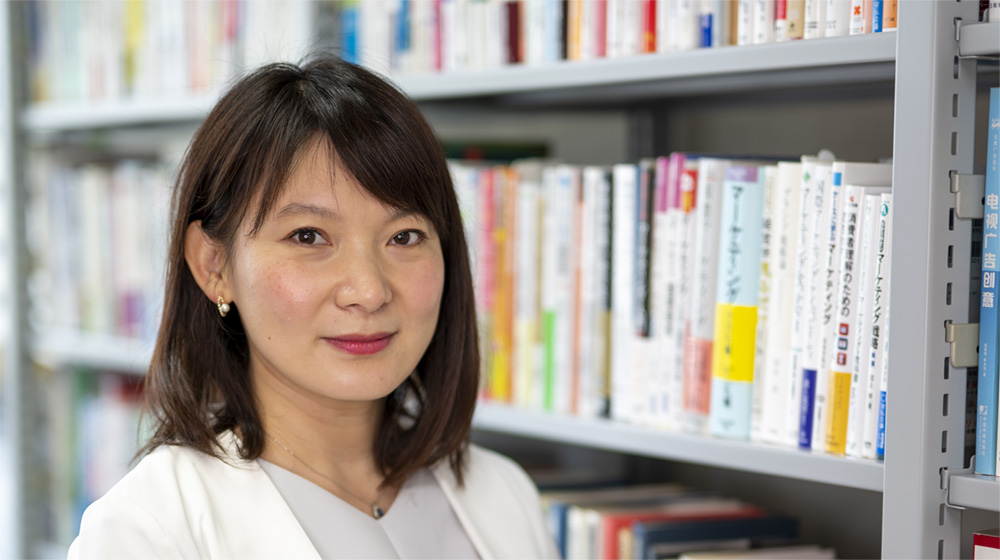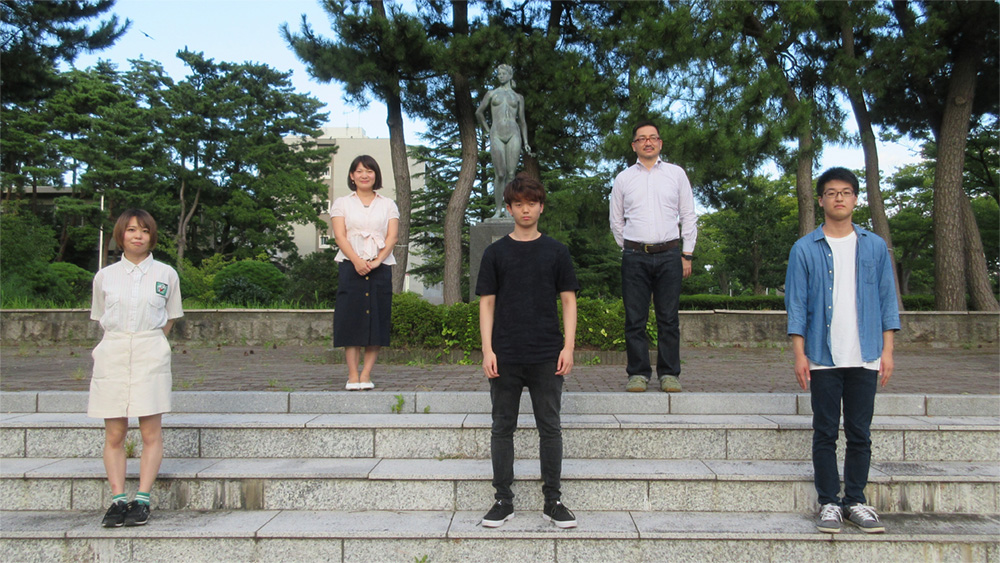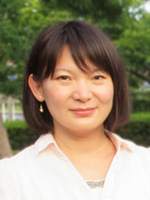[Interview] How to Best Communicate the Outstanding Capabilities and Knowledge of Japanese SMEs to the World – ZHANG Wenting

Dr. Zhang researched large-company-based global advertising strategies when she was in graduate school. However, nowadays, meta-national advertising carried out by leveraging the characteristics of each local market is gaining attention, and the potential for utilizing the outstanding capabilities and knowledge that local SMEs have is growing. Here we explore how Japanese SMEs can best communicate their message to the rest of the world.
Doubts about the media seen during childhood travels abroad
――First of all, tell us how you ended up in Japan.
Zhang When I was in the fifth grade, my father got a job transfer to Japan, so I came to Japan along with my parents. I started going to an elementary school in the city of Otawara, Tochigi Prefecture, not able to speak any Japanese at the time. Since there were no other foreigners at the school, I was often looked at in an unusual way.
I wasn’t that lonely, but it was difficult to communicate. At first, we used Kanji in conversations, but there were many misunderstandings because the meanings of Kanji are different in Japan and China.
――What kind of child were you? Did you have a career that you wanted to pursue?
Zhang Growing up, I was a quiet child during the period from kindergarten to the first years of elementary school, partly due to my father being a strict disciplinarian. One day in the first grade, I was punched by a boy sitting next to me. I am still friends with him today, but at the time, that made me want to “be strong, ” so I began to wear my hair and clothes like a boy. Those feelings made me think I wanted to become a police officer. Currently I’m a university lecturer, and I feel that the people I met and the advice I received led me to my current teaching position.
――What is your field of research, and what made you decide to engage in it?
Zhang I specialize in SME and Marketing Communication Theories. The doubts I had as a child traveling back and forth between Japan and China about the gap between the images of foreign countries shown on TV media and reality were probably what got me started on my current path. Later on, I joined the Course of Information and Communication Studies of the Faculty of Humanities at Niigata University to conduct research in the field of cross-cultural comparison through media.
At present, I would like to move forward with research that ties together research on SMEs conducted at the SME Knowledge Network Center and my field of expertise, which is cross-cultural media comparison. Until now, I think most advertising has been company-based and centered on large companies, but in the future it will be possible for companies to communicate the best message while incorporating knowledge from outside the company, rather than just the company communicating unilaterally. Accordingly, I would like to expand my research to include how to exchange, nurture, and utilize advertising knowledge among SMEs or between SMEs and local entities.
Utilizing the strengths of Japanese SMEs abroad
――What do you think the advantages of SMEs are?
Zhang Of course, small and medium-sized companies have the advantages of “speed” and “agility” and “flexibility.” In large companies, there is distance between the decision-maker and the person in charge on-site, which means starting new projects takes time and involves procedures. The strength of SMEs is that they don’t have to deal with that distance or taking that time. The low barrier between the top and bottom increases the likelihood of getting ahead in terms of customer satisfaction and market share.
――What do you think is required of SMEs in Japan today?
Zhang With increased new needs due to the maturation of Japanese society and the diversification of customer needs, the contribution of innovations by SMEs in those areas that large companies are unable to address is starting to get attention. Japanese manufacturers originally had customers in the Japanese market in mind and were more focused on improving their manufacturing capabilities to increase performance and reliability, and consequently increase profits (prices). However, introducing such high-quality, reliable technology and products abroad (e.g., in emerging markets) can sometimes result in “excessive-service.” Therefore, a strategy to determine what price and performance customers in the local market are looking for will be necessary. I think there should also be a high level of integration with local SMEs, with each company communicating while taking into account the unique characteristics of each local market and sharing and their outstanding capabilities and knowledge.
Cherish your student days now as time you can spend with your friends
――Is there anything you wish you had done while you were a student? Any advice you can offer?
Zhang My four years at university went by truly quickly. There are many things I should have done more of, but if I had to say anything, it would be that I should have valued the time with my friends more. When I was a student, I was always working several part-time jobs. I didn’t want to burden my parents, so I was desperately trying to earn money for living expenses and school fees.
I went on five trips with my friends over the four years, including a seminar trip, and each one is a cherished lifetime memory. We made a firm promise to each other to definitely go on a trip every year after our graduation, but we were only able to keep that up for the first two years or so. Different lifestyles and geographical distances make it very difficult to get everyone together. It may be that the only time you can spend a lot of time with your friends is during your time as a student. I hope you will cherish the time you spend with your friends, even in the current circumstances.
――I see. I think I would like to cherish the friendships I can get involved in during my limited time as a student.
Profile
Interview date: September 1, 2020
Interview/text: YAGASAKI Narumi (Undergraduate student, Faculty of Economics)

(Front row) Interviewers
Related Link:
SMEs Knowledge Network

 ZHANG Wenting
ZHANG Wenting